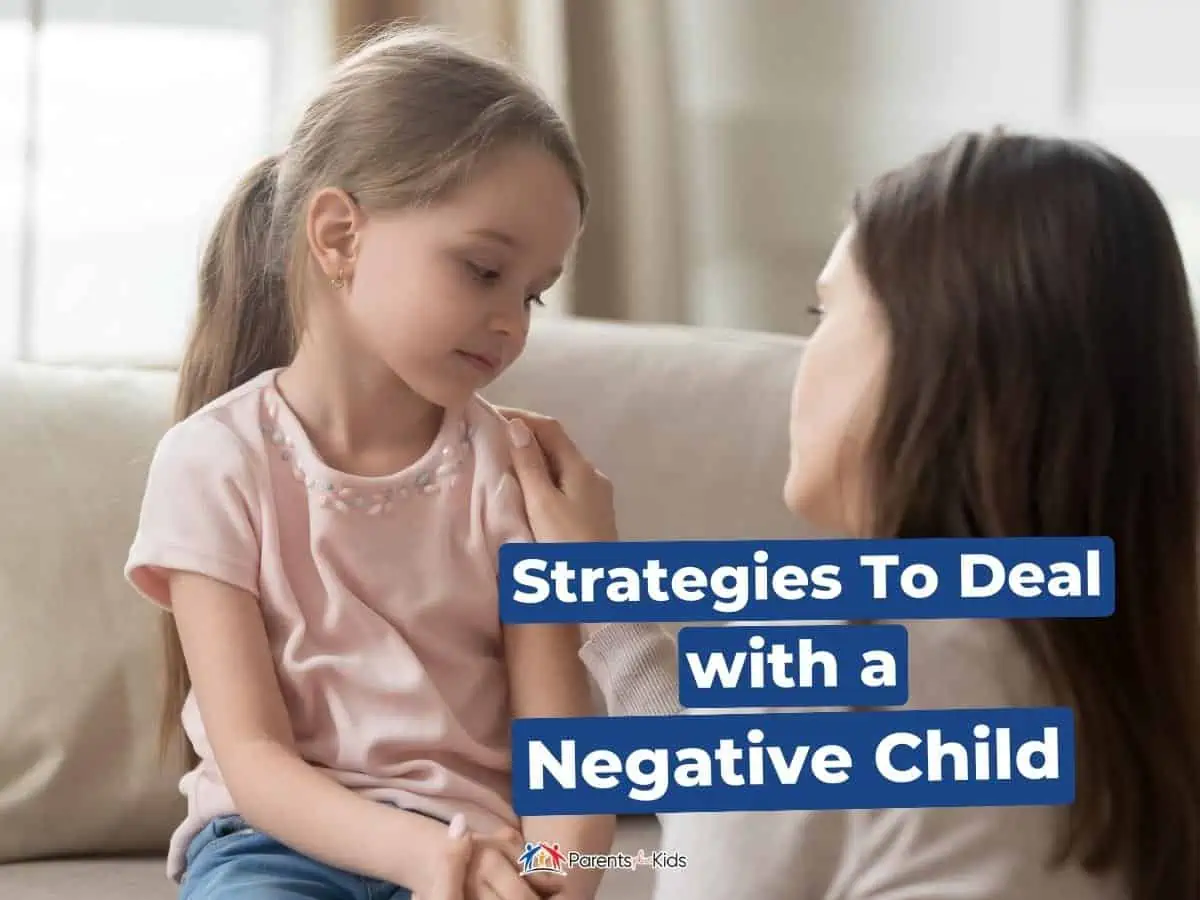10 Parenting Strategies To Deal with a Negative Child

This post may contain affiliate links. If you buy through the link, I may earn a commission. Learn More.
A negative child is one who seems to always be in a bad mood.
They have a difficult time finding joy. They don’t seem to like any food, clothing, or toys you give them.
A persistent, unpleasant mood can exhaust even the most understanding person.
What’s a parent to do?
10 Parenting Strategies To Deal with a Negative Child
Negative children may have several reasons for their behavior.
Some have underlying physical or mental health concerns that can affect their ability to be happy.
Some might be feeding off the negativity of those around them. It is important to address underlying issues when managing negativity.
1. Identify Mental Health Concerns
The most common reason a child is negative is because they suffer from anxiety or depression.
Left untreated anxiety can make a child feel sad or even angry.
Talk to your child’s pediatrician if you have concerns about their mental health. The pediatrician can refer you to a therapist who specializes in pediatric psychology.
They can help you with a diagnosis and a plan of action.
This will probably include regular sessions with a therapist, breathing techniques, and in extreme cases, medication.
2. Rule-Out Physical Disorders
The most negative child I have ever met was my best friend’s daughter. Her mood ranged from unhappy to exploding volcano of doom.
I had known this child for 10 years before I ever saw her smile. What was the change? Dairy.
Her lactose intolerance was so slight that it didn’t register on a hydrogen breath test.
When their doctor recommended a dairy-elimination diet, she suddenly became a happier child.
She had been suffering from gas pains, light nausea, headaches, and fatigue.
Since she had always felt these pains, she didn’t realize it was possible to live without them until dairy was removed from her diet.
You should not immediately cut out dairy if your child is negative. But, you should talk to your doctor about health issues that may be concerning.
3. Pay Attention to Your Own Behavior
Children often copy the people around them.
Are you a negative person? You may not realize it, but it is possible.
Spend a day being aware of your thoughts, words and actions. Do you complain often?
Do you find yourself focusing more on negativity than positivity?
Do you say or think negative things about your personality or appearance? Do you always expect the worst in any given situation?
If you said yes to even one of these questions, you might be creating a negative atmosphere for your child.
4. Observe Your Surroundings
A negative child might be responding to the things happening around them.
Parents who are often arguing or angry with each other affect their children in ways they might not realize.
The aura of negativity seeps into a child’s psyche and gives them a downtrodden view of the world.
This is also true if your family is facing a great deal of stress.
Divorce, a move, financial problems, new jobs, and illnesses are all factors that can make a child act and feel negative.
You may not be able to remove these issues, but you can talk to your child about them and help them understand.
5. Seek Gratitude
A great way to help your child see positivity in daily life is to teach them gratitude.
Look for all of the wonderful things for which they can be grateful. Have older children make lists while younger children can draw pictures.
If you want to really go nuts with it, let them paint a mural on a wall in your home. Yes, I do have a gratitude mural in my garage.
There is a painting of a sun, a rainbow, a kangaroo, what might be a swingset, marshmallows, and several jellyfish and flowers.
My mural is permanent, but you can instead paint a wall with chalkboard paint and let them draw their gratitude with chalk on a daily basis.
- Turns virtually any interior surface into a chalkboard
- Easy to use. No special tools or processes needed
- 100% Acrylic
6. Talk With Teachers
Older children who are suddenly negative may be having problems at school.
A child who is suffering from bullying might be internalizing the stress they feel during the day.
Ask your child’s teacher if they have noticed a change in behavior.
Ask about interaction with peers, playground behaviors and performance in class.
7. Don’t Focus on Negativity
Once you rule out health issues and bullying, stop focusing so heavily on your child’s negative attitude.
They may behave negatively because they enjoy the attention. Negative attention seeking behavior is unfortunately common.
It will also escalate the more the child needs attention. Instead of giving attention to a child’s negative behavior, praise positively.
Look for your child’s pleasant, positive attributes and focus your attention thusly.
8. Encourage Social Interaction
Neither of my children were negative people until 2020. Like most places, our local schools were closed.
I was homeschooling my children and none of us had any interaction outside of our four-person bubble.
My daughter made the best of a bad situation but my son spiraled. He was never happy, nothing was pleasant and everything sucked.
I tried all of my mom’s tricks to make him happy again, but nothing worked until my husband and I relented and let him play football with some of the older kids.
There was no tackling or touching. They were socially distanced. All kids wore gloves and masks.
Still, they were together. His negative energy dissipated and he was back to being himself again.
Sometimes, kids just need other kids.
9. Offer Emotional Outlets
Younger children can learn how to manage their emotions using breathing techniques and kid-friendly yoga.
Older kids can benefit from journaling and mindfulness exercises.
If these outlets don’t work, seek hobbies that may entertain the mind and refocus those negative feelings.
Try different types of hobbies, from sports to arts to nature walks.
One thing to avoid is extra screen time, which has been shown to contribute to mental health issues.
10. Let Them Feel Their Feelings
You cannot talk someone who is sad into feeling happy. Allow your child to feel their negativity but don’t allow them to do it alone.
Ask them what they are feeling and why. Tell them you would like to be able to help.
If they don’t want to talk, let your child know that you love them the way that they are.
Let them know that all emotions are valid, both happy and sad.
Key Takeaways
Excessive negativity in a child might not be eliminated but it should be investigated.
Ensure your child isn’t suffering from a mental or physical health issue, and then help them see the bright side of life.
Do you have issues with a negative child? Share your story in the comments.

